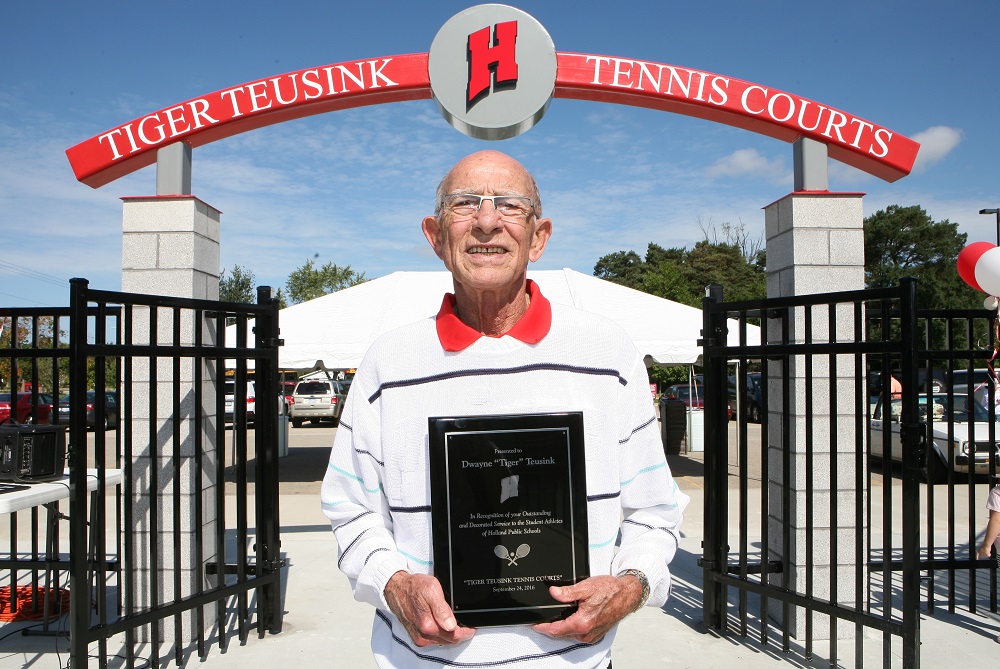
In Memoriam: Tiger Teusink (1936-2021)
By
Geoff Kimmerly
MHSAA.com senior editor
September 9, 2021
Dwayne “Tiger” Teusink, a longtime Holland tennis legend and a prominent foundation builder for MHSAA tennis at the statewide level, died Monday, three days before his 85th birthday. A coach for nearly a half-century, he also continued to assist the MHSAA in administering the sport nearly until his death.
Teusink, a 1954 graduate of Holland High and later Hope College, began his teaching career at Wyoming Lee, then moved on to teach and coach high school tennis at Jackson for seven years and then Holland for 35. He retired from teaching in 1989 but continued to coach at Holland High until 1998. He also served for a time as athletic director.
He leant a significant behind-the-scenes voice in the formation of high school tennis as it’s played in Michigan today. He was on the committee that in 1976 introduced the flighted MHSAA tournament structure developed to promote a team format that remains the standard. While at Holland, Teusink managed 63 Regional and 17 MHSAA Finals tournaments, and he served on the Finals seeding committee from 1980-2011. He continued assisting with the draw through 2019 and provided data for Finals seeding through this spring.
Teusink coached high school teams to a 453-176-4 record with 13 conference and 16 MHSAA Regional titles, and his Holland boys team was a runner-up at the 1976 Class A Final. He also coached at Hope College from 1994-2009. Holland High School’s tennis facility was renamed “Tiger Teusink Courts” in 2016.
Teusink earned induction into the Michigan High School Tennis Coaches Association Hall of Fame in 1986, the Michigan High School Coaches Association Hall of Fame in 1989 and the National High School Athletic Coaches Association Hall of Fame in 2003. He was named National High School Coach of the Year by the United States Tennis Association in 2005, receiving his award at the U.S. Open.
Click for his obituary, and also for a Second Half feature from 2016.
PHOTO: Tiger Teusink stands with the plaque presented to him in 2016, when the Holland High School tennis courts were renamed in his honor. (Photo courtesy of the Holland athletic department.)

NFHS Voice: Find Answers at Youth Level
November 13, 2019
By Karissa Niehoff
NFHS Executive Director
Are there long-term solutions to increasing the number of participants in high school sports and improving parental behavior at high school contests? The answer to both questions might start at the youth sports level.
The NFHS hosted a first-ever meeting of about 25 leaders of National Governing Bodies and the U.S. Olympic & Paralympic Committee last week to discuss common concerns and opportunities to align and work together.
Within the youth areas of these organizations, the issues are familiar ones to high school leaders – decline in participation, parent behavior, coaches education and minimizing the injury risk. Clearly, however, reaching parents with appropriate educational messages on sportsmanship, injury risk and the values of participation is a top priority for leaders at all levels – youth, middle school and high school sports.
Recently, the NFHS formed a Middle School Committee in an effort to build interest in education-based sports at that level and to share the proper messages with parents before their kids reach high school. However, as we learned last week, middle school may even be too late!
Those educational messages will be enhanced if the process starts in out-of-school youth sports. If messages about the values of multi-sport participation, playing for the love of the game, and limiting contact in sports like football are consistently shared and demonstrated at the youth level, the education-based concept should be firmly in place by the time students reach high school.
Coaches education is another common concern. While the NFHS has created an outstanding online education program for interscholastic coaches through the NFHS Learning Center (www.NFHSLearn.com), there is no standard requirement to coach at the youth level. There should be some type of required certification for anyone to walk onto a field or court to coach. And while knowledge about teaching the proper tackling form in football or the proper defensive positioning in basketball is important, those are not the most important prerequisites for coaching.
Similar to the NFHS’ online Fundamentals of Coaching course, youth coaches should be required to take courses that help them learn how to coach the kids more so than the sport. And since many of the coaches at this level are parents of players on the team, these individuals – and all youth parents – should be presented materials similar to what is presented at preseason meetings at the high school level. This would include, among other things, the non-negotiable requirement to positively support their child while letting the coaches coach, and the officials officiate.
Lofty goals, for sure, without a collective governing organization over youth sports. However, these concepts can be endorsed and promoted within the youth areas of sport-specific NGBs. These fundamentals of education-based athletics are essential for the 2-3 percent who play sports beyond high school as well as the majority who apply the values learned in high school sports in their chosen careers.
The skills will eventually fade – even for those individuals who play sports beyond high school – but the values learned from playing sports, beginning at the youth sports level, will last a lifetime.
Dr. Karissa L. Niehoff is in her second year as executive director of the National Federation of State High School Associations (NFHS) in Indianapolis, Indiana. She is the first female to head the national leadership organization for high school athletics and performing arts activities and the sixth full-time executive director of the NFHS, which celebrated its 100th year of service during the 2018-19 school year. She previously was executive director of the Connecticut Association of Schools-Connecticut Interscholastic Athletic Conference for seven years.

